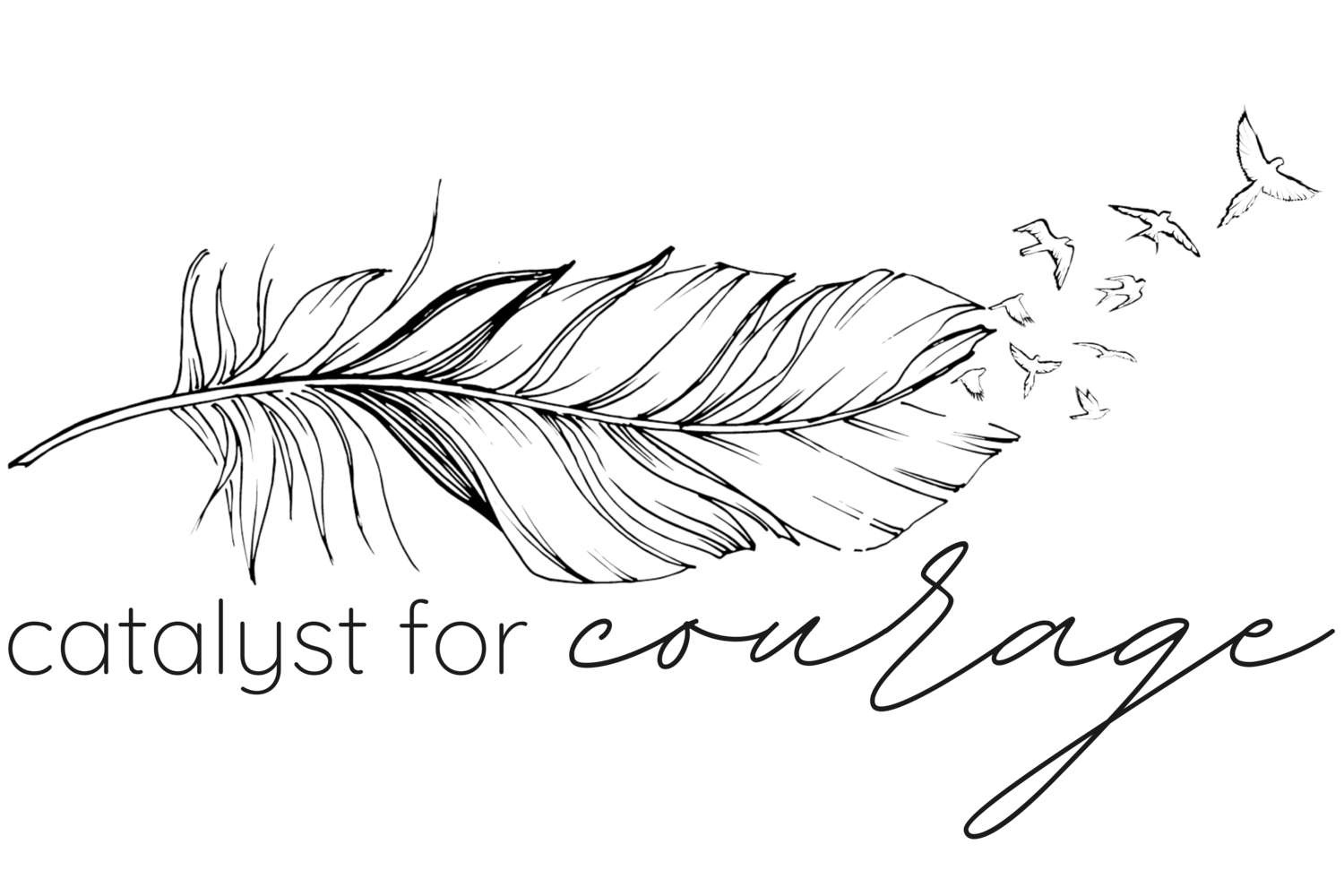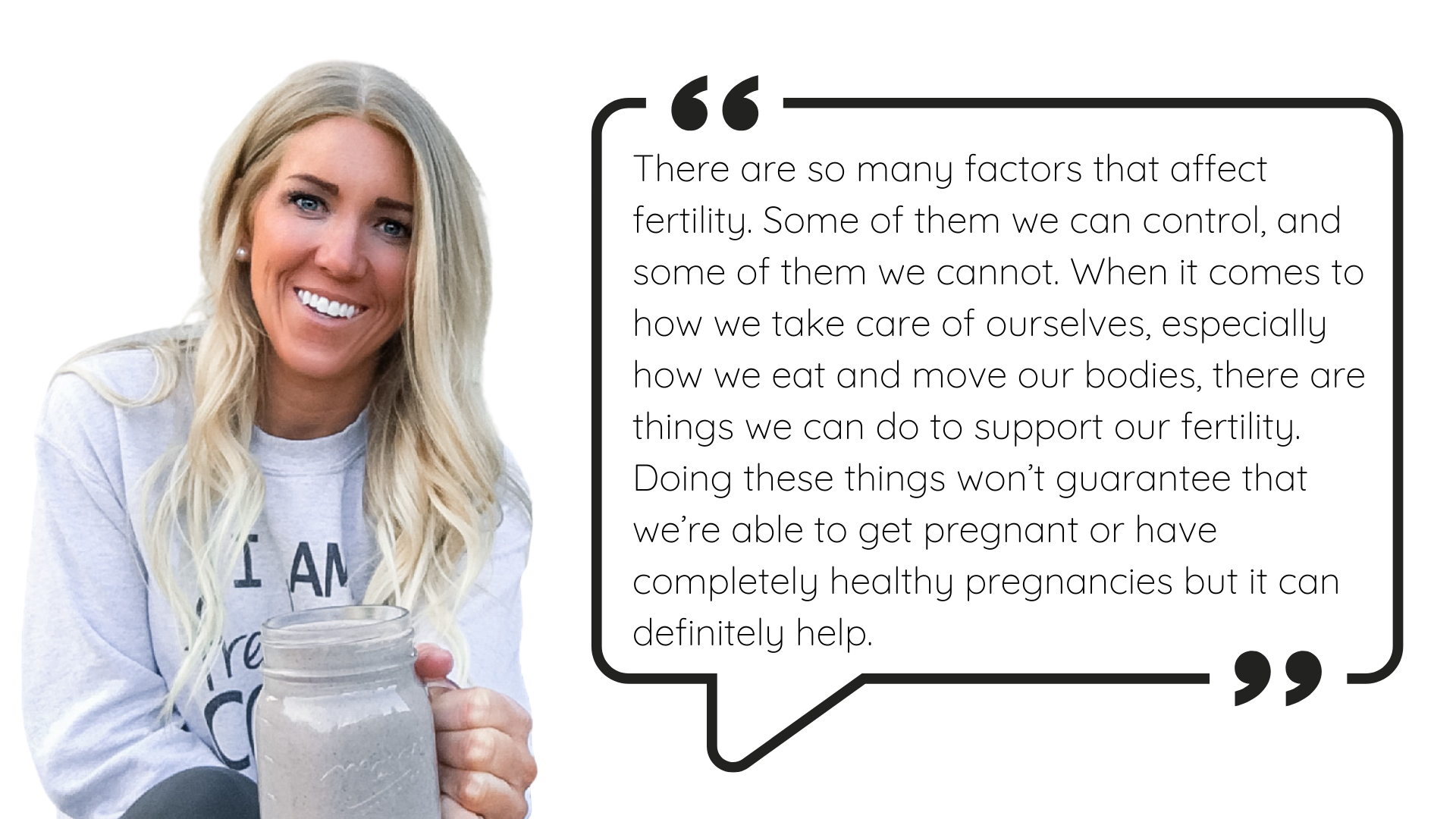Eating to Support Fertility
I am really excited to introduce Andie to you all on the blog today. I met Andie on Instagram and knew instinctively that we were kindred spirits. Andie has been a registered Dietition Nutritionist for 9 years and holds a bachelor’s degree in dietetics and a master’s degree in nutrition science. I love her perspective on eating intuitively and her views on listening to and honoring your body. Andie runs her own business "Dietitian Andie" where she provides virtual nutrition coaching to help women stop dieting, heal their relationship with food, and learn to create healthy habits that are sustainable. She herself struggled with an eating disorder in college and she loves being a dietitian today and being able to use her past struggles to help other women. Andie loves to hike, camp, ride horses, waterski, spend time on the lake and do anything outdoors. She lives in Arizona with her husband and four horses (which she treats like her children) and they hope to add human children to their family soon. In her article, Andie shares practical tools and tips you can implement right away to start eating to support your fertility. Without further ado, keep reading below for Andie’s incredible words and insight.
Nutrition
The first thing you can do is focus on our nutrition. You must eat enough calories in order to support fertility. Under-eating due to skipping meals, strict diets, and general restriction for any reason can lead to nutrient deficiencies and stress on the body that can make it harder to conceive and carry a healthy baby. Additionally, being underweight or undernourished (especially if you don’t have a regular period) can drastically decrease fertility. Your body can actually start to “halt” certain functions, like your menstrual cycle, in order to put its energy toward more essential functions, like keeping you alive!
There are certain nutrients that you should prioritize in your diet to make sure you’re setting yourself and your body up for success. Nutrients such as iron and folic acid are important in supporting fertility. Foods like meat, beans, spinach, fortified cereals, and shellfish are high in iron. Furthermore, combining high iron foods in the same meal as foods that are rich in Vitamin C, like bell peppers, tomatoes, oranges, strawberries, sweet potatoes, winter squash, can increase iron absorption, so it’s a good idea to include these foods in your diet. Folic acid does not necessarily improve fertility, but it is an important nutrient for growing a healthy baby. In order to get adequate folic acid to support a healthy pregnancy, make sure to include foods such as legumes, asparagus, eggs, citrus fruits, and broccoli in your diet. It is also a good idea to consider a folic acid supplement.
A study done at Harvard Medical School found that positive effects on fertility were linked to folic acid, vitamin B12 and omega-3 fatty acids. Most pre-natal vitamins contain folic acid and vitamin B12, and you can get omega-3 fatty acids from fish and other seafood, nuts and seeds, and fortified foods (certain eggs, yogurt, milk and juice). Another study found couples that ate seafood more often had a higher likelihood of getting pregnant than couples that consumed seafood very rarely. This doesn’t mean you need to start having fish for every meal, but consuming fish and other seafood 2-3 times a week may have a positive impact on your fertility.
Antioxidants are another key nutrient that can affect fertility. Free radicals (oxygen-containing molecules with an uneven number of electrons) can cause harm to the reproductive process. The uneven number of electrons allows free radicals to easily react with other molecules and can cause large chain chemical reactions in our body because they react so easily with other molecules. When we consume antioxidants, it neutralizes those free radicals so they no longer have negative effects on the reproductive process. Common antioxidants are vitamin C, vitamin E, folate, beta-carotene, zinc and copper. Foods you can add to your diet that are high in antioxidants include: blackberries, raspberries, blueberries, pineapple, oranges, spinach, olives, mushrooms, asparagus, broccoli, artichokes, cloves, mint, sage, nutmeg, rosemary, ginger, cinnamon, grape, cranberry juice, walnuts, pecans, peanuts, pistachios and others.
When trying to improve your fertility, it is best to avoid fad diets and any diet that is restrictive. Diets that restrict certain foods, nutrients, or calories can lead to inadequate nutrition, which can decrease fertility. Additionally, losing weight or being underweight can also cause problems when it comes to our fertility. When our body fat percentage is too low, our body is not able to continue normal reproductive functions, causing anovulatory cycles or periods that are irregular or non-existent. A minimum of 17% body fat is required for menarche and a minimum of 22% is required for maintenance of ovulation, but some people may find they need even higher body-fat percentages for optimal fertility. If your body percentage falls below your ideal body fat percentage for your body, it may become much more difficult to conceive so make sure you are eating enough. The best way to do this is to avoid diets and restriction of any kind.
Intuitive eating is a concept based on listening to your body and honoring your hunger cues and cravings. This can be a great step toward improving your fertility if you are someone who has previously restricted calories or has been on a lot of different diets. Working with a dietitian coach to help you learn how to listen to your body, heal your relationship with food, and create healthy habits that are sustainable can be incredibly helpful.
Exercise
Another factor that goes along with nutrition is exercise. We know that exercise is good for us. In some cases, if you are severely overweight or obese, losing weight can improve fertility and exercise can be a wonderful way to help you achieve a healthy weight that will improve your fertility. Exercise improves not only our physical health, but our mental health as well. However, over-exercising can put excess stress on the body, which can have a negative effect on fertility. Studies have found that aerobic exercise for 7 or more hours per week and intense exercise in women of normal weight may decrease fertility. In most cases, this does not mean that you should stop exercising altogether, but it may be a good idea to limit strenuous exercise to less than 4 hours per week and incorporate more moderate intensity exercise – such as walking, yoga, stretching and other slower paced exercises. If you have hypothalamic ammenhorrea and are working to recover your period or ovulation, it may be helpful to stop strenuous exercise for a period of time and allow your body to recover and heal.
Overall, the best things that you can do to support your fertility and chances of getting pregnant are to:
Follow a healthy but unrestrictive diet – consume plenty of calories, fruits, veggies, seafood, omega-3 fatty acids, folic acid, B12, iron, and antioxidants
Practice intuitive eating and learn to listen to and honor your body
Take a pre-natal vitamin with folic acid and B12
Make sure that you are not underweight or have a body fat percentage below 22%, if needed – work towards healthy weight gain
In some cases, weight loss may be beneficial but make sure to work with a dietitian and doctor to achieve weight loss in a healthy way – no fad diets
Get in regular movement, but practice more moderate intensity exercise and limit strenuous exercise to less than 4 hours per week
Take care of yourself, practice self-care and give yourself grace
These tips of course, won’t guarantee that you will be able to get pregnant if and when you want (as there are many factors that come into play), but these practices of good nutrition and exercise will help you prepare your body in the best way to bring a baby into the world if and when that time comes.
Sources:
https://www.eatright.org/health/pregnancy/fertility-and-reproduction/fertility-foods
https://www.health.harvard.edu/blog/fertility-and-diet-is-there-a-connection-2018053113949
https://ods.od.nih.gov/factsheets/Omega3FattyAcids-Consumer/#h3
https://academic.oup.com/jcem/article/103/7/2680/5001729?login=false


